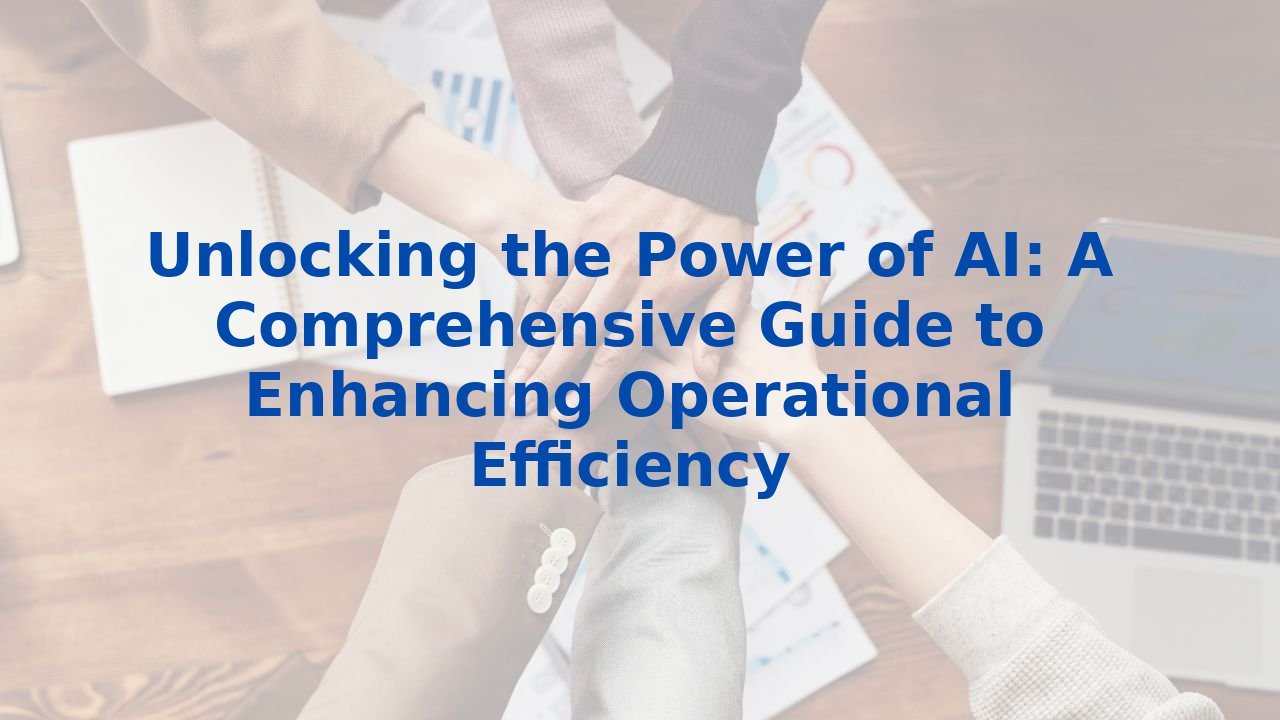Unlocking the Power of AI: A Comprehensive Guide to Enhancing Operational Efficiency
Unlocking the Power of AI: A Comprehensive Guide to Enhancing Operational Efficiency
Introduction
In an era where every second counts, operational efficiency isn't just a buzzword; it's the backbone of thriving organizations. Enter Artificial Intelligence (AI)—the game-changing force poised to transform the way we work. From automated tasks to intelligent decision-making, AI isn’t just a tool; it's a revolution. This guide explores how AI can enhance operational efficiency and unlock a new era of productivity for organizations.
Understanding Operational Efficiency
At its core, operational efficiency is about maximizing productivity while minimizing waste and costs. It’s the fine art of optimizing processes to ensure that tasks are executed swiftly, accurately, and with minimal overhead. Traditional methods, often reliant on manual processes, can fall prey to inefficiency and human error. But the silver lining? The power of AI—in capable hands—can elevate your operational game.
The Role of AI in Enhancing Operational Efficiency
AI emerges as a catalyst for efficiency, unlocking new potential across various business processes. Here are some pivotal ways it contributes:
- Predictive Analytics: AI systems sift through historical data to forecast future trends, identifying potential hurdles before they manifest. This proactive approach minimizes downtime and ensures resources are deployed optimally.
- Automation of Routine Tasks: By automating repetitive tasks, AI alleviates the burden on human resources. This shift not only reduces errors but also allows employees to focus on strategic, creative areas of their roles.
- Optimization of Processes: AI applications harness data-driven insights to identify bottlenecks, improving workflows with tailored recommendations. Suddenly, hidden inefficiencies become apparent, and the path to streamlined operations is illuminated.
- Enhanced Productivity and Cost Reduction: When routine tasks are delegated to AI, employees can devote their time to high-impact work, driving innovation and productivity to new heights without inflating costs.
- Improved Accuracy: With their ability to process vast amounts of information, AI models excel in tasks requiring precision. This accuracy, especially in quality control roles, translates to better decision-making and improved outcomes.
- Scalability and Agility: AI adapts effortlessly to fluctuating workloads, allowing organizations to scale without the proportional increase in staffing. This agility is indispensable in today’s dynamic market landscape.
Practical Applications of AI in Business
As organizations increasingly embrace AI, its applications span various domains:
- Customer Service: AI-driven chatbots respond quickly and accurately to customer inquiries, transforming the support landscape while enabling businesses to provide personalized experiences at scale.
- Marketing: Intelligent systems utilize analytics to craft targeted campaigns, boosting engagement and conversion rates through tailored interactions based on customer preferences.
- Supply Chain Management: AI forecasts needs in real-time, optimizing inventory levels and ensuring timely deliveries while keeping costs in check.
- Human Resources: AI enhances talent acquisition by refining job postings and personalizing employee development programs, aligning skills with organizational goals.
- Cybersecurity: AI safeguards sensitive information by detecting anomalies indicative of potential security threats, creating a formidable defense against cyber risks.
Benefits of Training Employees for AI
Integrating AI into the workplace brings a dual challenge: harnessing its potential while ensuring employees are equipped to navigate these new capabilities. Here's why investing in AI training is a game-changer:
- Enhanced Collaboration: Well-trained employees develop a deeper understanding of AI systems, fostering seamless collaboration that maximizes the efficacy of AI insights.
- Improved Decision-Making: Those skilled in AI can interpret insights effectively and integrate them into their decision-making processes, leading to more judicious choices.
- Adaptability: A workforce trained in AI tools is better prepared to pivot in response to changing demands, ensuring that organizations remain agile in a volatile landscape.
Conclusion
The transformative potential of AI in enhancing operational efficiency is undeniable. As businesses harness these technologies, they become not just more productive but also more adept at navigating change. Understanding AI's capabilities and investing in employee training will position organizations for sustained growth and success in an increasingly competitive world. Embracing the AI revolution is more than a strategic move; it’s a call to action for leaders who aspire to unlock the full potential of their operations.
To take your first step into the world of AI and Training, explore various resources available to guide your organization's transformation. Understanding the landscape of education in AI, like what’s offered through tailored programs, can help you embark on this empowering journey.



